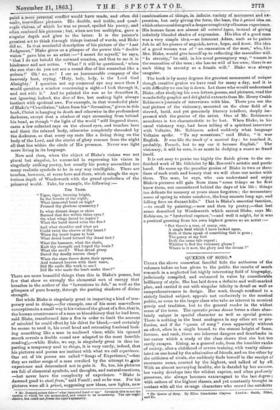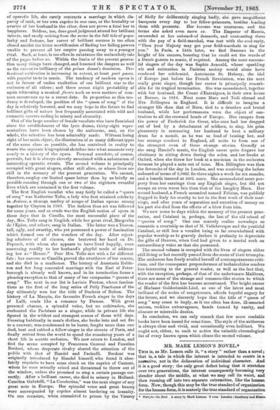QUEENS OF SONG,
UNDER the above somewhat fanciful title the authoress of the volumes before us has given to the public the results of much research in a neglected but highly interesting field of biography, judiciously compiled, and enhanced in value by considerable brilliancy of style. She has laid down a definite and well-marked plan, and carried it out with singular felicity in detail as well as comprehensiveness in design. Her work, though confined to a strictly limited subject, appeals not exclusively to the musical public, or even to the larger class who take an interest in musical gossip and tradition, but to the general reader in the widest sense of the term. The operatic prima donna forms a class abso- lutely unique in special character as well as special genius. There is nothing in the least analogous in any other art or pro- fession, and if the "queen of song" rises apparently without an effort, often in a single bound, to the utmost height of fame, fortune, and rank, there are inherent dangers and drawbacks in her career which a study of the class shows that she but too rarely escapes. Rising, as a general rule, from the humbler ranks of society, after a childhood of severe training, with vanity stimu- lated on one hand by the admiration of friends, and on the other by the criticism of rivals, she suddenly finds herself in the receipt of enormous sums, courted by the highest, and talked of by all. With an almost unvarying fatality, she is dazzled by her success, her vanity develops into the wildest caprice, and often profusely generous, she always becomes extravagant to the last degree ; with suitors of the highest classes, and yet constantly brought in contact with all the strange characters who crowd the outskirts • The Queens of Song. By Ellen Creathorne Clayton. London : Smith, Flier, and Co.
of operatic life, she rarely contracts a marriage in which dis- parity of rank, or her own caprice in one ease, or the brutality or avarice of her husband in the other, does not prove a fatal bar to happiness. Seldom, too, does good judgment attend her brilliant talents, and rarely retiring from the scene in the full tide of popu- larity and fortune, her career of brilliant success is too often -closed amidst the bitter mortification of finding her failing powers unable to prevent all her empire passing away to a younger rival. Such, at least, is too often in substance the melancholy tale of the pages before us. Within the limits of the present genera- tion many things have changed, and lessened the dangers as well as the excessive brilliancy of the prima donna's dominion. Pro- fessional cultivation is increasing in extent, at least pan i prusu, with popular taste in music. The tendency of modern opera is -not in favour of undue exaltation of one brilliant star to the exclusion of all others ; and there seems slight probability of again witnessing a musical furore such as were matters of com- mon occurrence up to a recent date. In proportion as this ten- dency is developed, the position of the "queen of song" of the day is relatively lowered, and we may hope in the future to find brilliant gifts of nature less frequently associated with wild and romantic careers ending in misery and obscurity.
Out of the large number of female vocalists who have flourished -since the establishment of the lyric drama, thirty-eight repre- sentatives have been chosen by the authoress, and, on the whole, the selection has been admirably made. Without losing sight of her main object, the illustration of as many different types of the same class as possible, she has contrived in reality to weave the separate Mographical sketches into what amounts very nearly to a history of the opera. Personal anecdote, of course, prevails, but it is always cleverly associated with a substratum of interesting operatic events. The second volume is principally occupied with great singers, either still alive, or whose lives are still in the memory of the present generation. We cannot, therefore, employ our limited space better than by as briefly as possible running through one or two of the eighteen eventful lives which are contained in the first volume.
The first English vocalist who may fairly be called a "queen -of song" was Katherine Tofts, a lady who first attained celebrity in Arsinoe, a strange medley of scraps of Italian operas strung together by Clayton in 1703. The fashion thus set was followed for some years, and so crude was the English notion of opera in those days that in Camilla, the most successful piece of the day, Mrs. Torts sang in English, while her great rival, Margerita de l'Epine, and others, sang in Italian. The latter was a Tuscan, tall, ugly, and swarthy, who yet possessed a power of fascination which formed one of the wonders of the day. After reject- ing admirers of all classes, she bestowed her hand on Dr. Pepusch, with whom she appears to have lived happily, even answering readily to her husband's playful mode of address- ing her as "Hecate." Poor Mrs. Tofts met with a far different fate ; her success as Camilla proved the overthrow of her reason, and she died in a madhouse. The history of Anastasia Robin- son and her long concealed marriage with the Earl of Peter- borough is already well known, and in its termination forms a pleasing exception to that of many of her companion "queens of song." The next in our list is Lavinia Fenton, whose fascina- tions as the first of the long series of Polly Peachurns of the day ultimately won her the title of Duchess of Bolton. The history of La Manpin, the favourite French singer in the days of Lulli, reads like a romance by Dumas. With great personal charms, a splendid voice, but no cultivation, she enchanted the Parisians as a singer, while in private life she figured in the wildest and strangest seenes of those wild days. Dressing habitually in man's clothes, she broke into and set fire to a convent, was condemned to be burnt, fought more than one duel, beat and robbed a fellow-singer in the streets of Paris, and finally retired from the world to spend the remaining years of a short life in ascetic seclusion. We now return to London, and find the scene occupied by Francesca Cuzzoni and Faustina Bordoni, whose desperate rivalry shared the attention of the public with that of Handel and Farinelli. Bordoni was originally introduced by Handel himself, who found it abso- lutely requisite to have some check on the caprice of Cazzoni, whom he once actually seized and threatened to throw out of the window, unless she promised to sing a certain- passage cor- rectly. After a brilliant career, she died in misery in Holland. Caterina Gabrielli, "La Cuochetina," was the next singer of any great note in Europe. Her splendid voice and great beauty were accompanied by caprice almost bordering on insanity. On one occasion, when committed to prison by the Viceroy of Sicily for deliberately singing badly, she gave magnificent banquets every day to her fellow-prisoners, besides loading them with presents. Her income was enormous, and the terms she asked even more so. The Emperor of Russia, astounded at her unheard-of demands, and contesting them with the pay of a field-marshal, was met with the cool reply, "Then your Majesty may get your field-marshals to sing for you." In Paris, a little later, we find Rameau in the height of his suceess, boasting that he could set the words of a Dutch gazette to music, if required. Among the most success- ful singers of the day was Sophie .Arnould, whose sparkling wit and estimation in Parisian society would alone have rendeied her celebrated. Antoinette St. Hubery, the idol of Europe just before the French Revolution, was the next really great singer, though her career is principally remark- able for its tragical termination. She was assassinated, together with her husband, the Count d'Entraigues, in their own house at Barnes, in 1812. Next come Mara and Todi abroad and Mrs. Billington in England. It is difficult to imagine a stranger life than that of Mara, tied to a drunken and brutal husband, while her performances were the object of con- tention to all the crowned heads of Europe. Her escapes from the power of Frederick the Great, who once had her dragged out of bed by a detachment of soldiers, to sing, his grim pleasantry in sentencing her husband to beat a military drum for a month, as be was so fond of beating her, and her strange conduct in England, all unite to form one of the strangest even of these strange stories. Grandly as she sang Handel's music, the English never quite forgave her obstinacy in sitting down during the solos, and her freaks at Oxford, when she threw her book at a musician in the orchestra because he played a note out of tune. Mrs. Billington was then the favourite of the day in London, and was receiving the before unheard-of terms of 3,000/. for three nights a week for six months, and a benefit insured at 500/. more. She accumulated more pro- perty from her earnings than any English singer, but did not escape an even worse fate than that of the haughty Mara. Her second husband, a French scoundrel named Felican, was publicly flogged in Italy for cruelty to her in the first week of their mar- riage, and after years of separation and extortion of money on his part she died from the effects of a blow horn him.
We now come to days within the memory of the present gene- ration, and Catalani is, perhaps, the last of the old school of "queens of song." One can scarcely realize nowadays so romantic a courtship as that of M. Vallebrecque and the youthful Catalani, or still less a vocalist being so far overwhelmed with popular worship as to gravely declare it profanity to depreciate the gifts of Heaven, when God had given to a mortal such an extraordinary voice as that she possessed.
The second volume is occupied with the lives of singers either still living or but recently passed from the scene of their triumphs. The authoress has freely availed herself of contemporaneous criti- cism, and the consequent preponderance of technicalities renders less interesting to the general reader, as well as the fact that, with the exception, perhaps, of that of the unfortunate Malibran, there are none of the strange and romance-like stories to which the reader of the first has become accustomed. The bright career of Madame Goldschmidt-Lind, as one of the latest and most brilliant of the series of songstresses, affords hopeful augury for the future, and we sincerely hope that the title of "queen of song" may cease to imply, as it too often has done, ill-assorted unions, reckless extravagance, heads turned by vanity, and obscure or miserable deaths.
In conclusion, we can only remark that few more readable books have been issued for some time. The style of the authoress is always clear and vivid, and occasionally even brilliant. We ought not, either, to omit to notice the valuable chronological list of evely known opera which closes the second volume.































 Previous page
Previous page